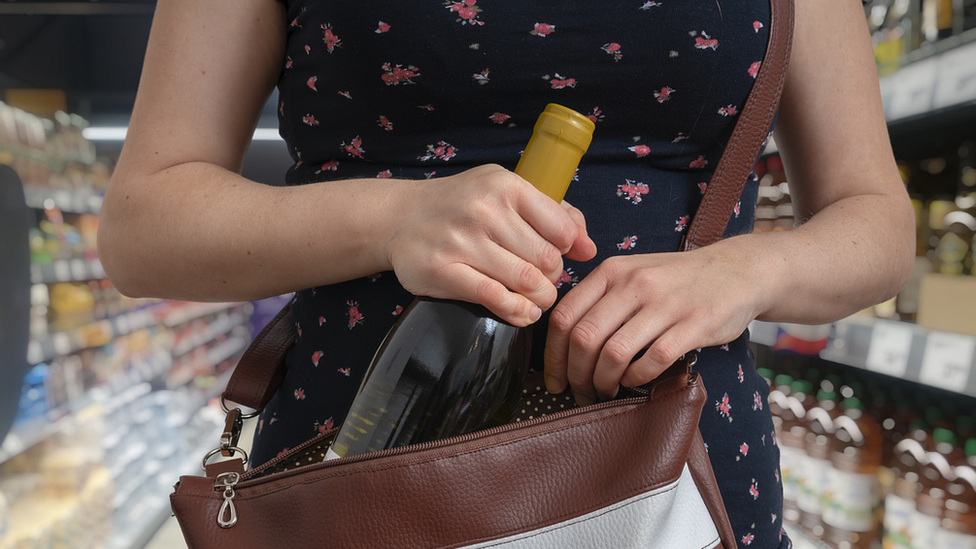Shoplifting hits record high in England and Wales

Shoplifting offences recorded by police in England and Wales have risen to the highest level in 20 years.
More than 430,000 offences were recorded last year - up by more than a third than the previous 12 months to December 2022, according to the Office for National Statistics (ONS).
This is the highest figure since current police records began in 2003.
Organisations representing retailers say these figures represent a fraction of the true number of incidents.
The latest ONS crime survey said police had also been dealing with unprecedented levels of stealing from individual people, with recorded personal theft at its highest level since 2004.
One retailer from south Wales told the BBC she had lost goods worth tens of thousands of pounds to shoplifting last year and has had to install expensive anti-theft technology to keep her business viable.
Fiona Malone, who has run a convenience store and Post Office in Tenby with her husband Vince for 10 years, said she had placed high value items behind the counter but found that wine, beer and bread kept disappearing from the shop floor.
"Last year we lost about £26,000 in shoplifting, which is huge for us," she said. "We are a little family-owned business so the impact on our profits was quite significant.
"People think 'I'll just take that, I'll put it in my pocket, it's only a fiver, it doesn't matter' but it has a huge impact on our business."
Ms Malone has invested in AI technology to monitor suspicious activity on the shop floor. All members of staff have headsets that can be used to record interactions with shoppers that can be passed on to police.
"It makes me feel very sad, I trust everybody and I don't expect people to steal things or be underhand," she added.
"If someone was really hungry and told me they were struggling we would help them, and then they wouldn't get a criminal record."
James Lowman, chief executive of the Association of Convenience Stores which represents local shops, said the official ONS figures were not surprising but represent a "fraction of the true picture of shop theft".
"The vast majority of incidents that take place end up not being reported because of the time taken to report the crime and the lack of follow up from the police," he said.
"Thieves are stealing on a regular basis without fear of apprehension, so it's essential that every police force in the country takes theft seriously, not least because challenging thieves is one of the biggest triggers for abuse of shop workers."
A recent survey by the British Retail Consortium (BRC) found that the surge in shoplifting went hand in hand with increased violence towards shop workers.
It found that incidents against retail staff - including racial abuse, sexual harassment, physical assault and threats with weapons - rose by 50% in the year to September 2023.
In response to the latest figures, the BRC's Graham Wynn said "inadequate police action" had given criminals "free rein" to steal goods.
"Not only has the number of thefts increased, but thieves are becoming bolder, more aggressive, and more frequently armed with weapons," he said.
He called on police forces to "get tough" on retail crime and ensure it was a high priority in future local policing plans.
The government recently announced that assaulting a shop worker would be made a separate criminal offence in England and Wales.
Neil Basu, former assistant commissioner of the Metropolitan Police, told a BBC Radio 4 Today programme debate earlier this week that neighbourhood policing models needed to return to tackle shoplifting offences.
"Unfortunately we lost the prioritisation of neighbourhood policing and we have to get that back," he said.
"That is actually the easiest way to communicate between agencies - through local people who know their communities, who know the people who live there and can help traverse those agencies and communicate between them."
Meanwhile, Laurence Guinness, head of London-based anti-poverty charity the Childhood Trust, said the high cost of living and families "on the breadline" had resulted in increased shoplifting offences.
"Money is not stretching far enough to meet the needs of the households," he said.
"If you've only got £15 a week to feed yourself and your family, you might put a packet of chicken breasts in your bag and [think] if you get caught you'll probably be OK.
"I'm not endorsing it, but I understand it and I think hunger is a very strong motivator of people taking things they just don't have the money for."
The Home Office said the rise in shoplifting was "unacceptable" and that it was working with police and retailers to crack down on retail crime, with the number of shoplifting charges up by 46% in the past year.
The government also said it planned to ramp up the use of facial recognition technology to catch perpetrators, as well as making serial shoplifters wear electronic tags to prevent reoffending.

